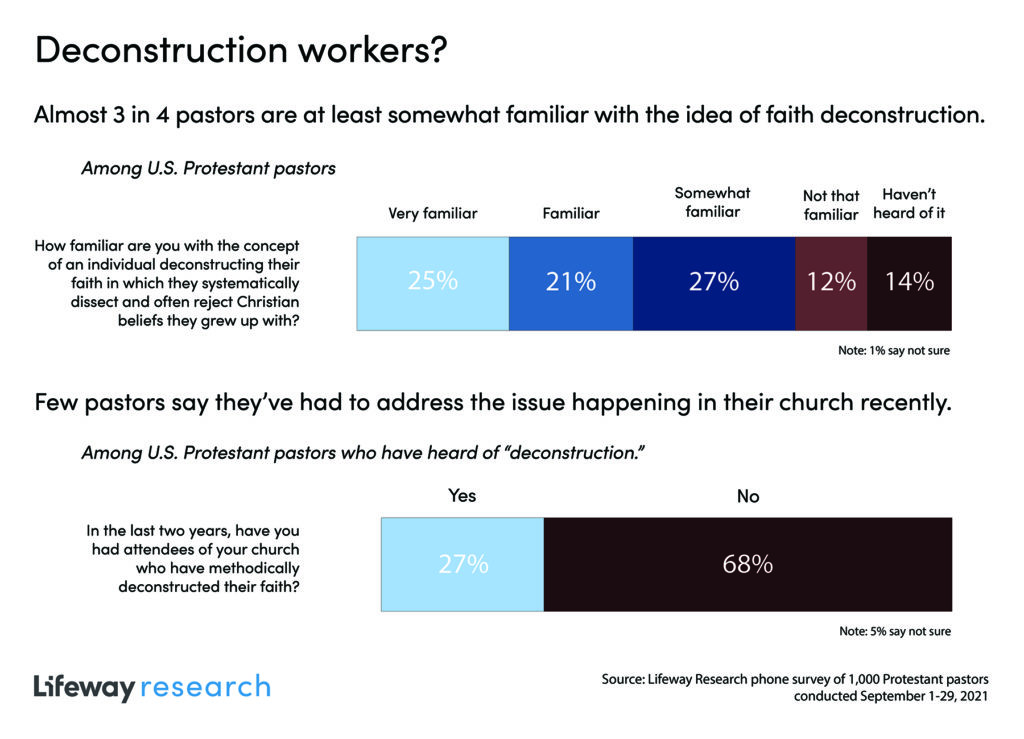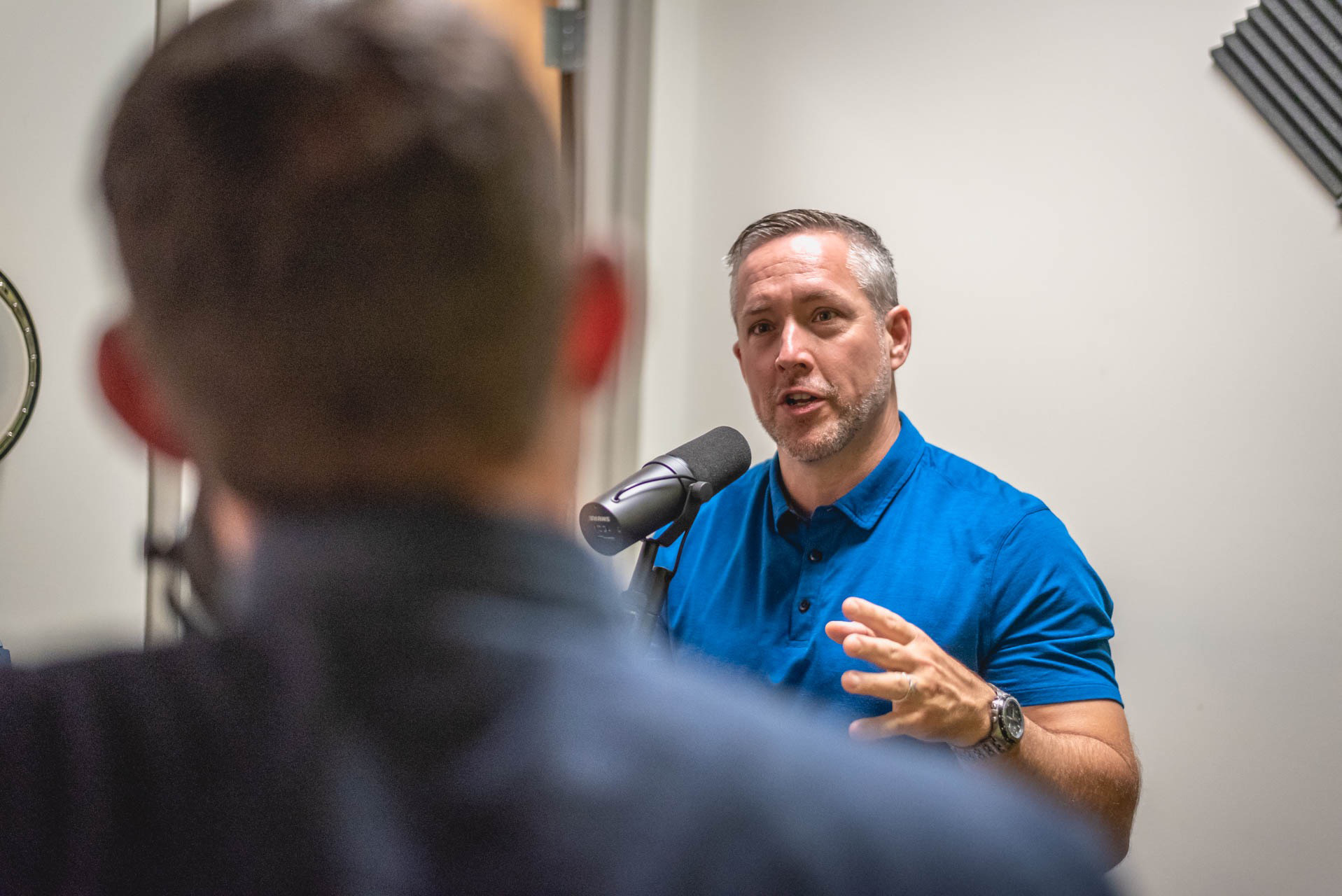
NASHVILLE (BP) – For some pastors, the only construction projects they worry about are building renovations, but others say they’re facing churchgoers who are tearing down aspects of their faith.
A Lifeway Research study of U.S. Protestant pastors finds almost 3 in 4 (73 percent) are familiar with the concept of deconstruction, and more than a quarter (27 percent) of those say people in their churches have deconstructed their faith.
When asked how familiar they are with “the concept of an individual deconstructing their faith in which they systematically dissect and often reject Christian beliefs they grew up with,” 25 percent of pastors say they are very familiar, 21 percent say familiar and 27 percent say somewhat familiar. While 12 percent say they’re not that familiar with the concept, 14 percent say they haven’t heard the term before, and 1 percent aren’t sure.
“In recent years, many Americans have stopped associating themselves with Christian churches,” said Scott McConnell, executive director of Lifeway Research. “While surveys have shown that many who don’t attend or claim to belong to a church still maintain many Christian beliefs, for a noticeable minority, the journey away from the Christian church begins with a change in beliefs.”
Age and education are key indicators of how knowledgeable a pastor may be about the concept. Younger pastors, those 18-44, are the most likely to say they’re very familiar with deconstruction (36 percent), while pastors 65 and older are the least likely to possess that same level of familiarity (12 percent). Pastors with doctoral degrees are the education level most likely to be very familiar (43 percent), and those with no college degree are the least likely (8 percent). Pastors without a college degree are also the most likely to say they’ve never heard the term before (27 percent).
Additionally, African American pastors (24 percent) are more likely than white pastors (13 percent) to say they’ve never heard of deconstruction before. Female pastors are twice as likely as male pastors (22 percent vs. 11 percent) to say they’re completely unfamiliar with the concept. Pastors in the West (20 percent) are more likely than those in the Midwest (11 percent) to say they’re completely unaware of deconstruction.
Deconstruction zone in the pews
Among pastors who are familiar with the concept of deconstruction, around a quarter say they’ve recently seen the effects in their congregations. More than 1 in 4 (27 percent) U.S. Protestant pastors who have heard the term before say they’ve had attendees of their church who have methodically deconstructed their faith in the past two years. Close to 7 in 10 (68 percent) say that hasn’t been the case for them. Another 5 percent aren’t sure.
“The use of the term ‘deconstruction’ emerged in the last few years and has been used both by those questioning their own beliefs and those desiring to help them find the truth,” McConnell said. “Despite the growing awareness among pastors, it may be easier to find people in the midst of deconstructing their faith on social media than within churches.”
Although much of the conversation surrounding deconstruction centers on experiences within evangelical churches, evangelical pastors who are familiar with the term are not likely to be familiar with it in their pews. Evangelical pastors who have heard of deconstruction are more likely than their mainline counterparts to say they haven’t had churchgoers deconstruct their faith in the past two years (72 percent vs. 62 percent). Denominationally, Baptist pastors (75 percent) are also more likely than those who are Presbyterian/Reformed (64 percent), Methodist (63 percent) or Restorationist Movement (55 percent) to say they haven’t seen deconstruction among attendees at their churches.
The deconstructionist trend is also less likely to be happening at smaller churches, at least according to their pastors who have heard of the term. Those at churches with worship service attendance of fewer than 50 are the least likely (16 percent) to say this has happened to one of their churchgoers in the past two years.
“In Matthew 11, Jesus tells the parable of the sower who sowed seeds to illustrate that people who hear the word about his kingdom react in different ways,” McConnell said. “Some go on to produce fruit, others abandon it immediately and others embrace it for a time before the seed is scorched or choked out. While the number who react in each way may change over time, each response to the message of Jesus’ kingdom persists today.”
For more information, view the complete report and visit LifewayResearch.com.
Methodology
The phone survey of 1,000 Protestant pastors was conducted by Lifeway Research Sept. 1-29, 2021. The calling list was a stratified random sample, drawn from a list of all Protestant churches. Quotas were used for church size. Each interview was completed by the senior or sole pastor or a minister at the church. Responses were weighted by region and church size to reflect the population more accurately. The completed sample is 1,000 surveys. The sample provides 95 percent confidence the sampling error does not exceed plus or minus 3.2 percent. This margin of error accounts for the effect of weighting. Margins of error are higher in sub-groups.





















